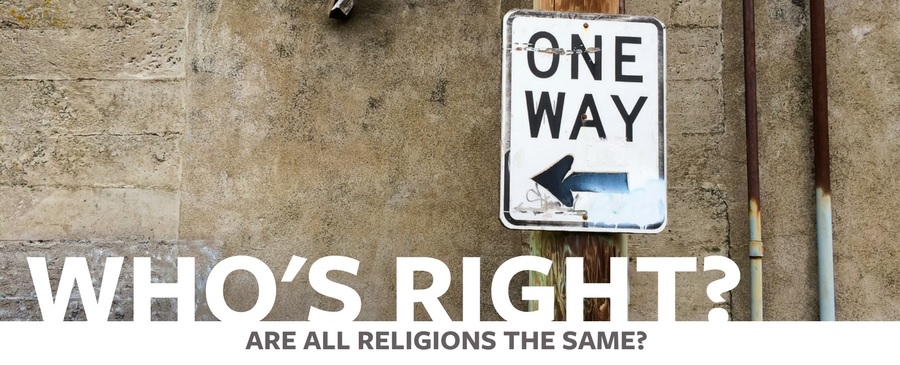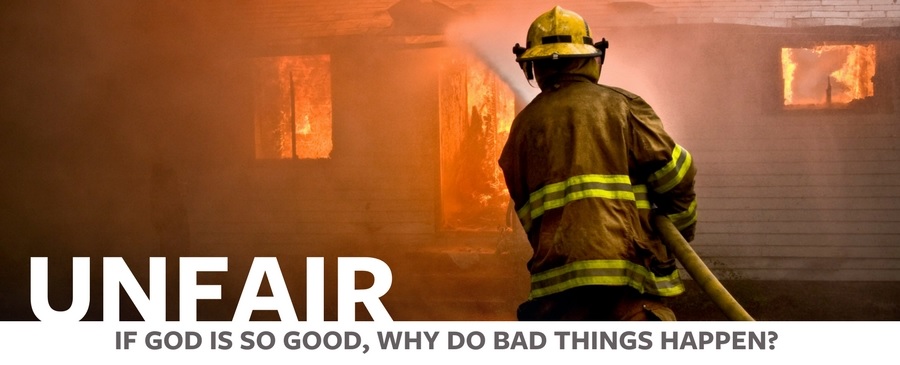

LAUNCH
When your math teacher gives you a problem to work and tells you to do it a certain way, how do you feel about that? Why do you feel that way?
It’s one thing for someone to tell you there’s one way to do a math problem. It’s another thing for someone to tell you there’s just one way to God, especially because many people believe all religions lead to the same place. Why is it so difficult to believe there is only one way to God?
EXPLORE
READ TOGETHER: Paul is a Christian that was visiting a town called Athens where they worshiped a lot of different gods. As Paul was walking through the town, he saw statues to these gods all over the place.
[We suggest that you use THE MESSAGE version of Bible for this study]
1. Read Acts 17:16-21. What was bothering Paul, and how did he respond (see verses 16)?
2. What was the focus of Paul’s preaching (verse 18)?
3. When talking with someone who has different religious views, it’s important to respect them even if you don’t agree with their views. Read Acts 17:22-23. How does Paul affirm the people?
4. What does Paul teach about God in verses 24-31 to give them a better understanding of the one true God?
5. According to verse 31, why is it so important for us to turn from our false ideas about God and worship the one true God through Jesus Christ? Read John 14:6 for more insight to this question.
APPLY
6. Based on this story, how do you think Paul would respond to someone who says, “It doesn’t matter what you believe since all religions lead to the same place?”
7. Why do you think it’s so attractive to believe that it doesn’t matter what you believe and that all religions lead to the same place?
8. What from this story strengthens your trust in God and his Son Jesus Christ? What questions or doubts remain about Jesus and how Christianity relates to other religions?
9. Why is it important to overcome the fear and awkwardness of talking with someone with different beliefs than yours about God?
10. As you have conversations, you might find people to be receptive, resistant, or open to further conversation, just like Paul did in verses 32-34? How might you handle these different responses?
11. As a result of this story, who do you think God might want you to talk with about Him?
For more on this topic:
Article by Keith Johnson
Every Student.com – Do all religions lead to the same God?

LAUNCH
Yesterday was not a good day! My mom and I live in a small apartment not far from my school. I was a little worried when she didn’t get home at her usual time, but then the phone rang. Mom had been in an accident, and even though she had several broken bones she would be all right. She had been hit by a drunk driver, who had walked away without a scratch. THIS IS SO UNFAIR!! She is such a good mom, who works really hard to support us and has never hurt anyone. God, why did this happen?
We are going to look at a similar situation found in the Bible in the book of John and find out what Jesus says about these things.
EXPLORE
Read John 9:1-11, John 9:35-38
1. What do you think Jesus is trying to accomplish in his relationship with the blind man?
2. Read John 9:6, 7 and 11. How does God bring good out of this man’s blindness?
3 .What are some things we know to be true about God? How can knowing these things affect our reaction when something bad happens?
There are a few more things to mention as we wrestle with why bad things happen:
PEOPLE SIN
Many bad things happen because people are sinful and do sinful things. Violence, theft, abandonment, selfishness, and mass murder all cause webs of pain that go far beyond the moment of the sin. God has given us free will to love or to sin. When people chose to sin, people get hurt. God could stop the consequences by taking away our free will and make us robots, but he values our free will too much to do that.
4. What are some ways you see people’s sin affecting you and those around you?
WE LIVE IN A FALLEN WORLD
When Adam and Eve chose to sin against God in the garden, the whole world was affected. Weeds began growing and making it harder to produce food; animals became dangerous to humans; humans’ bodies began wearing down, becoming diseased, and dying; storms became deadly; the world was no longer a safe and comfortable place for humans. This was not God’s original plan for the world — it was because of a choice that Adam and Eve made and it is still impacting us today. Today we see storms wipe out whole towns, family members die of disease, and many wrestle with life challenges like poverty or illness because we live in a fallen world.
5. What are some ways you see this fallen condition in recent world events or in your personal life?
GOD CHOOSES LOVE
God doesn’t like it when people suffer, but he values love above all. He could remove all evil by taking away any human choice, but if he did that, he would also be taking away the choice to love. To God, love is just too valuable to take away from us.
6. Would you rather live in a world where bad things happen, but there is love, or a world where nothing bad happens, but where love does not exist?
APPLY
7. Keeping these things in mind, how might you react if you were the girl in our story at the beginning of this lesson?
8. Have you had anything happen to you that caused great sadness or hurt? Did it pull you farther away from God or draw you closer to God?
9. Sometimes when people go through hard times, they become more interested in God. How can you love them well and help point people to Christ in the midst of their hard times?

LAUNCH
Imagine you’ve been sitting with DeMarcus at lunch. He talks about his science class a lot since it’s right before lunch. Everything DeMarcus has been hearing in science class is giving him second thoughts about his faith. “It just seems like everything I hear in science contradicts what I hear when I go to church or read my Bible.” What would you say to DeMarcus?
EXPLORE
1. Read Psalm 19:1-6. Some may see our huge universe as pointless and without purpose. What does verse 1 say about God’s purpose for the heavens, the sky, and the rest of creation?
2. Think about how vast the universe is (at least 100 billion galaxies with some like our Milky Way galaxy having 300 billion stars, according to skyandtelescope.com). Or consider how intricate the human body is (about 37 trillion cells, according to smithsonianmag.com). Some would argue it’s possible these things are the result of random chance. But how do you think the writer of Psalm 19 would explain these things?
3. Verses 2-3 say there’s no speech or words, but their voice goes out through all the earth. What do you think this means?
4. Verses 4-6 say the sun has an “excitement” about going through the sky each day to show off God’s awesomeness. It’s like a new husband jumping out of bed the morning after his honeymoon starts. What does this tell you about the way God has built his creation?
5. Read Psalm 19:7-9. What do these verses say about the truth of God’s Word?
6. How are God’s creation and God’s Word similar?
APPLY
7. Based on these verses, how do God’s creation and his Word relate?
8. How do you think the writer of verses 7-9 would encourage us to handle it when there’s a conflict between his Word and what science suggests?
9. How does good interpretation of the Bible and a good understanding of the scientific method help resolve some conflicts between Christianity and science?
10. Read Matthew 24:35. How does the relationship between science and Christianity ultimately depend on our view of Jesus and our trust in him?

LAUNCH
It was a snowy day and I was sitting at home wishing I was with my friends. All of a sudden I had a million messages show up on my phone, all about my cousin Robert who had just been arrested for buying alcohol (with a fake ID) for some 14-year-old boys. I knew I would see him at a family birthday party on Saturday and I was wondering, what will I say when I see him?
EXPLORE
1. Read Matthew 7:1-5. What does this say about us when we think about judging others?
2. What does it mean in verse 2 when it says, “With the measure you use, it will be measured to you”?
3. Who is the ultimate judge? How do we know what his standards are?
4. Does this passage mean we should overlook wrongdoing in others?
5. What are some behaviors we know the Bible does not support?
6. What are some less dramatic actions we are tempted to do everyday?
Have you ever judged someone for one of these and then found yourself doing the same thing?
APPLY
7. What about the person in our story? How do you think Jesus would have advised her to respond to her cousin?
8. Have you ever been in a situation where someone you know did something you believe to be wrong and you were tempted to judge them? How did you handle it?
9. Read 1 Corinthians 4:5. How does looking to Jesus as our ultimate judge help free us from being judgmental and give us compassion for people?
10. Share a situation in which you currently have a judgmental attitude toward someone
Leave A Reply
